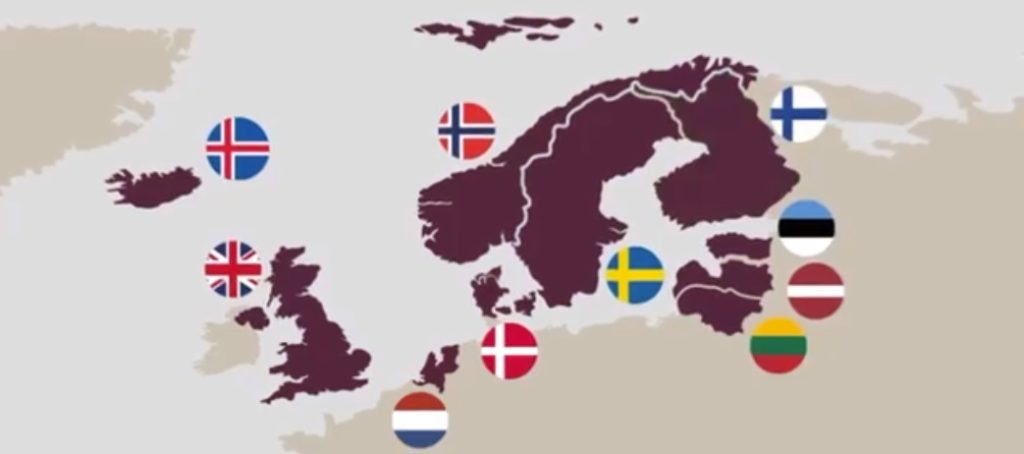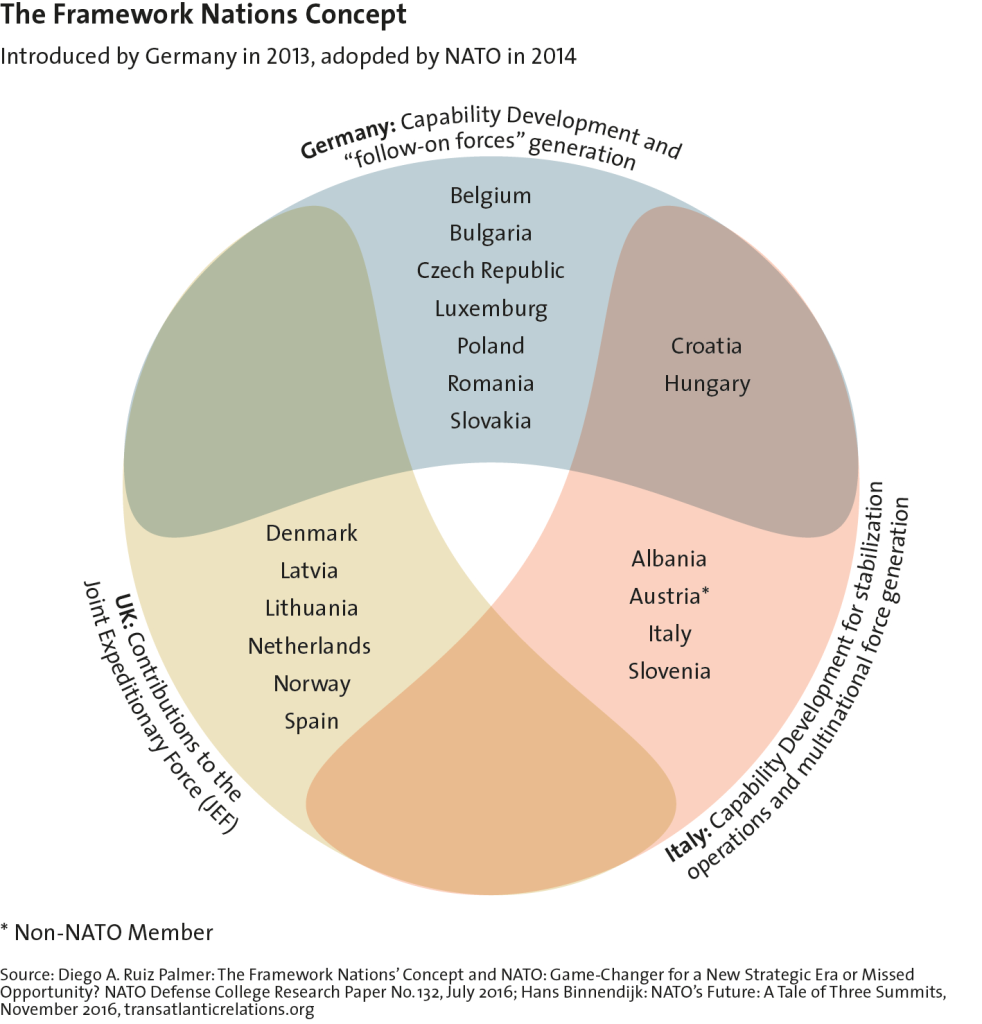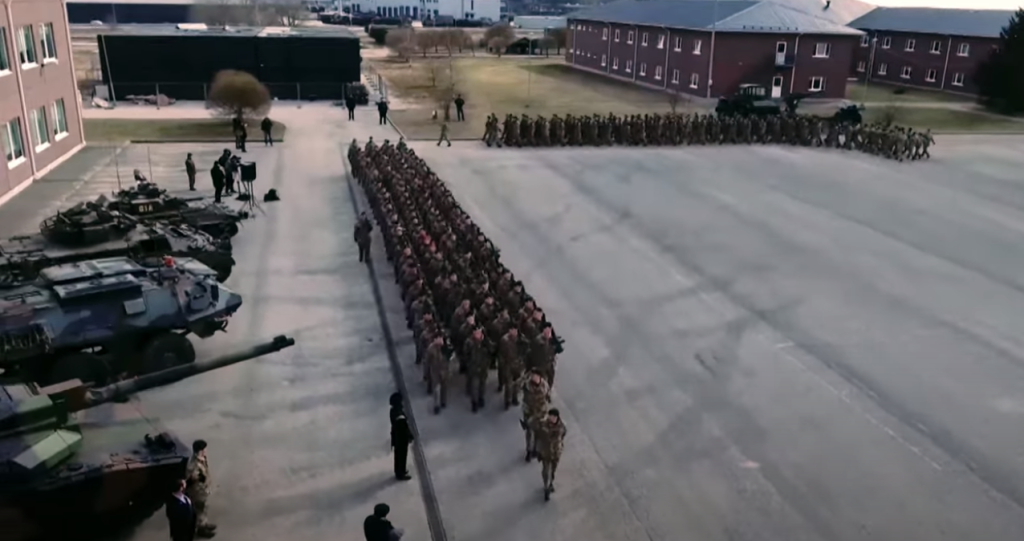Tjen Folket Media: Joint Expeditionary Force and Imperialist Rivalry in the Nordic

Joint Expeditionary Force and Imperialist Rivalry in the Nordic
By a commentator for Tjen Folket Media.
Joint Expeditionary Force (JEF) was established by the UK and consists of 10 North-European countries, including Norway. Can this be seen as a tool of Yankee imperialism in collaboration with the UK, not just against Russian imperialism, but also with the purpose of undermining German imperialism in Northern Europe?
The official purpose of the force is to be able to react quickly with joint efforts under British leadership, to improve NATO’s reaction time and to deter Russia. JEF includes the non-NATO-members Finland and Sweden, even though it is under British leadership and has as its purpose to support NATO. JEF is described as flexible and NATO-compatible, and is in practice an extension of the British military apparatus.
VIDEO: https://www.youtube.com/watch?v=gm_1E6ADQYg “Prime Minister Boris Johnson hosts the Joint Expeditionary Force …”
JEF was officially established after the British effort in Iraq and Afghanistan, to reconstruct their Rapid Reaction Forces and to strengthen the relationship with the other states.
A Concept of NATO-led Groups
British imperialism is among the world’s foremost military powers. By the western European powers, it is just France that can measure up with the UK. They were the largest contributor to the war in Afghanistan after the United States, and for a long time been USA’s closest allies on numerous occasions.

Picture: JEFs Member States.
Through the UK, NATO took the initiative to establish JEF after the NATO Summit in Wales in 2014. At this meeting, the Alliance adopted the German concept “Framework Nations Concept” (FNC), where Germany, the UK and Italy were to be commissioned to establish groups of Allies to develop forces and abilities that NATO has required. JEF differs somewhat from the original concept of FNC, which was proposed by Germany in 2013 as an initiative to strengthen European military cooperation. A proposal that would promote German hegemony within the EU and strengthen Germany instead of the United States. JEF, on the other hand, does the opposite.

Image: The original “distribution” of countries under the leadership of the UK, Germany and Italy, with specific tasks on behalf of NATO.
JEF consists mainly of personnel and material from British marine, army and air defense, and especially has the purpose of creating greater integration in common operations, in combination with forces from the other participants. After the UK’s exit from the EU, it has become more clear that they have other and often conflicting interests with Germany. JEF is thus a force that is not under the command of an EU country, and the non-EU-members Norway and Iceland also participate. Thus, a number of EU countries are incorporated in a strength under British command. Additionally, it includes Sweden and Finland, which are not NATO members, under NATO-member UK’s leadership.

Image: From the Forces’ film about the NATO exercise Cold Response in 2022.
Common Exercises and Statements Against Russia
JEF was formally founded by the UK, Denmark, Estonia, Latvia, Lithuania, the Netherlands and Norway in 2015, as these signed the contract to constitute the unified force. Sweden and Finland joined as members in 2017. Iceland became a member in 2021, but does not have its own military forces. After an agreement with the United States, they are responsible for Iceland’s “defence”.
JEF has since conducted several exercises in the Baltic Sea. The force has, according to its own statements “ability and will” to operate on their own without other states, although they are, in principle, to act in cooperation with NATO and the EU, as well as other Allies (read: principally the US). The intention of the force is that it should be in high perparedness and ensure Britain’s ability to respond quickly and anywhere in the world. The goal is to be able to “strike hard” without being a logistical or tactical inhibitor in coalitions, which will make the strength “welcome among friends and feared by enemies”.
Leaders in JEF has previously also said that nowhere is more important to the force than the Middle East and the Gulf, and that they would spend more time ensuring allies and deterring enemies in this region. With the war in Ukraine, it is clear that the focus on Europe will be stronger, at the expense of the focus on the Middle East.
A statement adopted by JEF’s member countries March 15, 2022, states that they will support Ukraine politically and military against Russia. They also write that they will behave complementary to NATO and the EU to ensure that Russia cannot “continue to threaten European security”, among other things by promoting more non-reliance on Russian oil and gas, strengthening the collaboration in JEF and “building an advanced defence in collaboration with allies”.
VIDEO: https://www.youtube.com/watch?v=tUPZnHRgugM “The Joint Expeditionary Force: A European asset | LIVE STREAM”
The competition and collusion of the Imperialists
Chairman Gonzalo states that imperialists are constantly in a state of competition and collusion. Even the unity of allied imperialists is merely a relative unity, because they are also competitors for the same markets, labor and natural resources, in the same oppressed nations. What does the role of the JEF become in this context?
Lenin writes in the book Imperialism (our highlights):
“The characteristic feature of imperialism is precisely that it strives to annex not only agrarian territories, but even most highly industrialised regions (German appetite for Belgium; French appetite for Lorraine), because (1) the fact that the world is already partitioned obliges those contemplating a redivision to reach out for every kind of territory, and (2) an essential feature of imperialism is the rivalry between several great powers in the striving for hegemony, i.e., for the conquest of territory, not so much directly for themselves as to weaken the adversary and undermine his hegemony. (Belgium is particularly important for Germany as a base for operations against Britain; Britain needs Baghdad as a base for operations against Germany, etc.”
In connection with JEF and all the talk of Nordic defence cooperation and the concrete situation in Northern Europe, we can state the following:
• The UK is one of the three largest western European imperialists, with obvious points of conflicting interests with the other two; Germany and France, which among other was expressed in “Brexit”.
• The UK is one of America’s closest Allies, and has in a number of occasions played the role of the “right hand” of the Yankee imperialists, for example in the invasion and occupation of Afghanistan.
• The largest imperialist by the Baltic Sea, other than Russia, is Germany, which has major economic and political interests in the Nordic countries, and even more so in the semi-colonies Estonia, Lithuania, Latvia and Poland.
• After the collapse of the Soviet Union in 1991, an expression of the collapse of revisionism in this superpower, large parts of Europe (including the Baltic countries and Poland), has been the subject of redivision. Countries that were colonies and semi-colonies of Soviet imperialism, experiences intrusion from principally US imperialism, seconded by Russian, German, British and French imperialism, without forgetting China, and also from small imperialists, like the Nordic countries.
On the basis of these points, our hypothesis is that we must understand JEF as a gathering of the Nordic countries under British military leadership, and that this operates as the right hand of Yankee imperialism, the world’s sole hegemonic superpower. JEF and other Nordic cooperation thus bears not only the character of alliance against Russian imperialism, but also that of a counterweight that weakens and undermines German hegemony around the Baltic Sea. And in this way, the German concept of FNC is turned against Germany, by Yankee imperialism uniting the Nordic and Baltic countries militarily through British imperialism, assuming the leadership of this miltary integration.
In this perspective, the talk of Norwegian opportunist parties of a Nordic defence alliance as “alternative to NATO”, which both SV and the Red party has proposed or implied, a line which instead of weakening Yankee imperialism, can help strengthen its influence in the Nordic region at the expense of German imperialism. In all cases, it is not a real alternative. NATO is an alliance of US imperialism and certain western great powers, where the US dominates. But NATO has little power or value in itself. NATO is not an supernational power over and outside Member States, at least not the United States, which dominate the Alliance. Thus, other structures can supplement and even strengthen Yankee-collaboration, as JEF does by integrating non-NATO-members (Sweden and Finland) in a British military concept complimentary to NATO.
VIDEO: https://www.youtube.com/watch?v=LoJhSkUP-7k “Volodymyr Zelensky speaks at PM’s summit of the Joint Expeditio…”
Semi-colonies and the Small and Large Imperialists
The Nordic and Baltic countries consists not only of imperialists, but also of the semi-colonies Estonia, Lithuania and Latvia. These are among the European countries that were previously semi-colonies of Soviet social-imperialism, and after the dissolution of the Soviet Union, became the prey of Yankee imperialism. Additionally, JEFs Member States are for the most part small imperialist states.
Lenin writes in Imperialism (our highlights):
“Alongside the colonial possessions of the Great Powers, we have placed the small colonies of the small states, which are, so to speak, the next objects of a possible and probable “redivision” of colonies. These small states mostly retain their colonies only because the big powers are torn by conflicting interests, friction, etc., which prevent them from coming to an agreement on the division of the spoils. As to the “semi-colonial” states, they provide an example of the transitional forms which are to be found in all spheres of nature and society. Finance capital is such a great, such a decisive, you might say, force in all economic and in all international relations, that it is capable of subjecting, and actually does subject, to itself even states enjoying the fullest political independence”
Lenin’s work was released in 1916 and he writes that at the time there were 6 imperialist great powers in the world: England, Russia, France, Germany, USA and Japan. At this time, China was a semi-colony. Since this time, China has liberated itself from imperialism through the New Democratic revolution (1949). The country then constructed socialism, before the revisionists conducted a coup in 1976 and transformed the country to an imperialist great power in the 1980s. After World War II, the USA became a hegemonic superpower. The Soviet Union became a hegemonic superpower during the leadership of the revisionists after the coup in 1956, but is currently merely a military superpower, a nuclear power, because they have a huge amount of nuclear weapons. Politically and economically, they have lost this position in the world arena as a result of the collapse of revisionism in 1991, and thus the USA is the world’s sole hegemonic superpower. They are economically, politically and militarily in a special position in the world.
The other great powers are imperialist great powers as they were in 1916, but the UK has lost a lot of power, mainly to the benefit of the United States. This happened through the first and especially through the second world war. Japan, Germany and France has also experienced great setbacks as a result of these wars. Furthermore, almost all the world’s colonies fought themselves free from the condition as colonies, that is, formally politically subjected to colonial powers. But these countries, including countries such as India, Turkey and Brazil, are still semi-colonies. This is clear when one examines their economy, their position on the world market and the economic relations they have to the imperialists and their monopolies.
In the Northern European context, the Baltic countries and Poland are sticking out as semi-colonies, something which can be seen quite clearly on Norwegian construction sites. One can also see it in the service industry and in investments in the Baltic countries and Poland. For example, Rema 1000 (Norwegian grocery store monpoly, translators note.) and it’s owner Reitan Convenience has a strong presence in Estonia. We see the same from Swedish and Finnish financial capital in the Baltic countries.
We apply Lenin’s analysis that there is rivalry between great powers and superpowers, which open the opportunities for the small imperialists, and this includes Northern Europe. Specifically, this means that the rivalry between the United States and Russia mainly, and secondly, their rivalry with Germany and the UK, opens up that the opportunity for the small Nordic imperialists get their semi-colonies. The small imperialists’ foremost advantage is, in addition to being allied to Yankee imperialism, that they are not Russia or Germany. Rivalry between the United States and Germany have shown itself among other things in the conflict of Russian gas to Europe and the gas pipeline Nord Stream II (through the Baltic Sea).
Our Finnish comrades in the Red Flag (Punalippu) have previously state this in their analyzes, and Norwegian revolutionaries should take up this standpoint. In this way, we can understand our own countries’ role in the Nordic region in general and specifically with regards to the semi-colonies by the Baltic Sea. Furthermore, we can thus also understand the role that a military force such as JEF has, and that this military cooperation obviously has political and economic implications.
Conclusion
To summarize briefly, we put forward the following hypothesis: Germany’s concept of creating military “subgroups” in support of NATO is applied, partly against Germany itself, by Yankee imperialism and British imperialism, to gather the Nordic countries under British leadership. This indirectly consolidates the hegemony of the superpower USA in northern Europe. It contributes to the weakening of German imperialism in the Nordic countries, to the benefit of the USA, and undermines the German hegemony, which is strong within the EU. In addition, JEF will unite the Nordic countries even closer around the USA in the Yankee’s struggle against Russia, where they strategically attempt to surround Russia, weaken and undermine their influence, and to take from them the position as an atomic superpower by encircling them with a “rocket shield” that can shoot down the nuclear rockets before they reach their targets.
For revolutionaries in the Nordic countries, the main enemy is ones own country, and we must struggle against domestic imperialism and it’s exploitation and oppression of the peoples in the semi-colonies. Secondly, we must combat Yankee imperialism and their conspiracies, because they are the world’s only hegemonic superpower and thus the principal enemy of all the peoples of the world. Finally, we have to reveal the rivalry between imperialists, both the big and small, and to not let us be drawn into their games as useful idiots for the agenda of one or the other imperialist. Our agenda is always to serve the people, always to struggle for the proletarian position, always to struggle for the party and the revolution. This means to fight for the construction of the revolutionary movement, to reconstitute the Communist Party as a militarized and Maoist party and to initiate the people’s war as part of and in the service of the proletarian world revolution.
References
FHS Brage: The UK Joint Expeditionary Force (JEF)
The Joint Expeditionary Force: Toward a Stronger and More Capable European Defense?
Kva er Joint Expeditionary Force?
Joint Expeditionary Force leaders’ statement: 15 March 2022 – GOV.UK
Norge deltar på møte i Joint Expeditionary Force – VGTV
UK Joint Expeditionary Force – Wikipedia
Joint Expeditionary Force – Wikipedia
The Framework Nations Concept. Germany’s Contribution to a Capable European Defence
NATO’s Framework Nations Concept – Center for Security Studies | ETH Zurich
The Framework Nations’ Concept and NATO: Game-Changer for a New Strategic Era or Missed Opportunity?
International Situation – Finland
UK to host Joint Expeditionary Force leaders for talks on Ukraine crisis
Norge deltar på møte i Joint Expeditionary Force – VGTV
Island nytt medlem i Joint Expeditionary Force – JEF – Norges Forsvarsforening
Island med i Joint Expeditionary Force
Discussed the security situation with the British Secretary of State for Defence – regjeringen.no
US Security Cooperation With the Baltic States – United States Department of State
